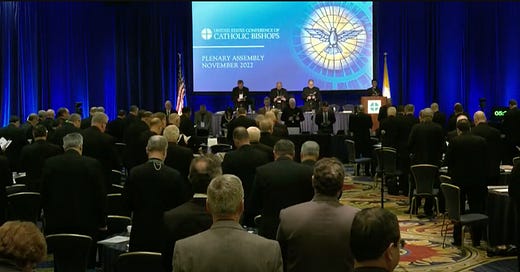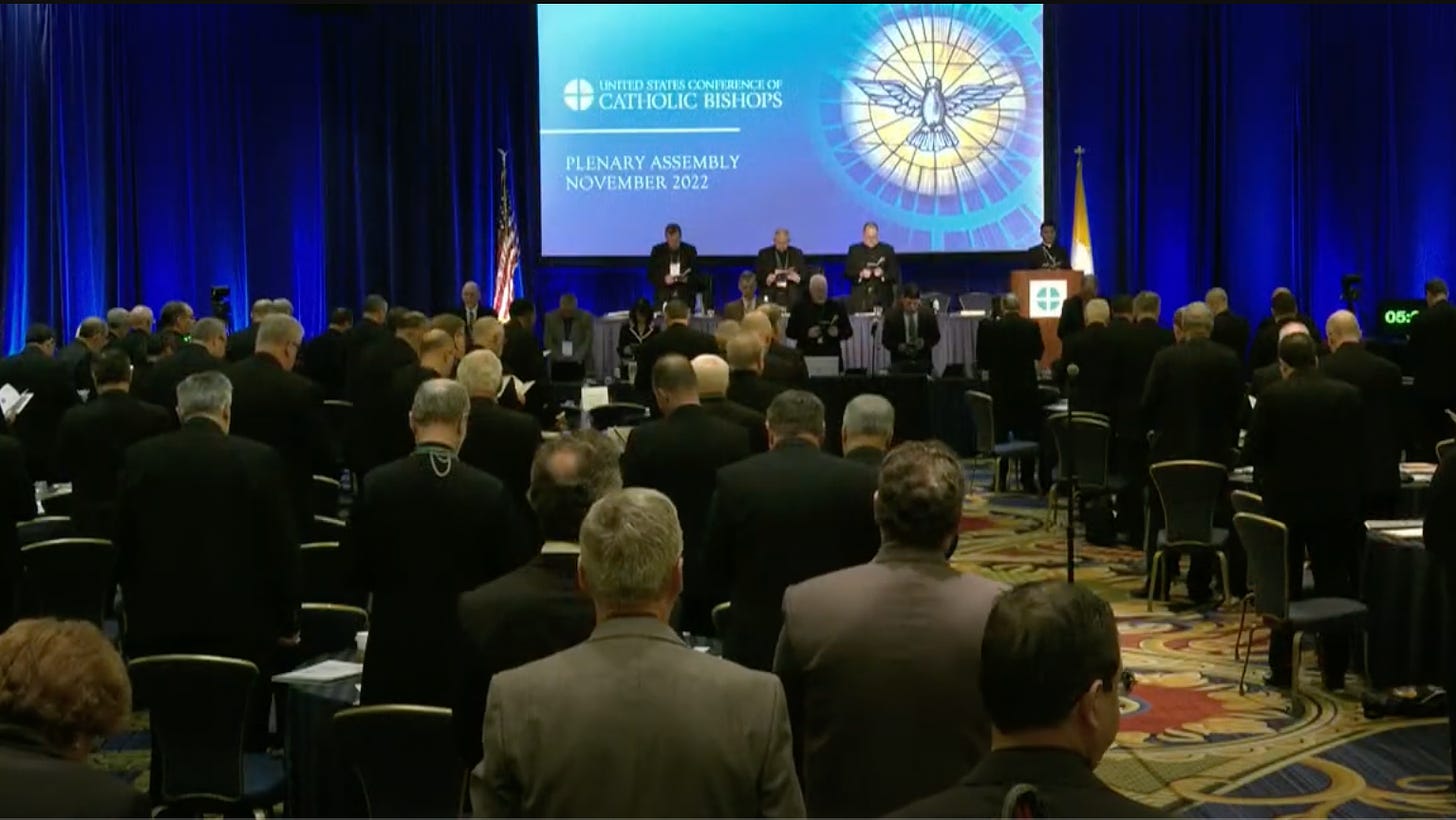
The Faithful Citizenship vote: A Pillar explainer
What happened with the U.S. bishops' Faithful Citizenship vote
The U.S. bishops voted overwhelmingly Wednesday to reissue without revisions their guide to political engagement, "Forming Consciences for Faithful Citizenship", along with supplemental materials, and to begin re-examining the document immediately after the 2024 election.
The guide has been the subject of intense debate at recent general assemblies, with a faction of the bishops having pushed to replace it with a new document consciously reflective of Pope Francis’ “new body of teaching.”
But what exactly is the document? What did the bishops say about it this week? And why does it matter?
The Pillar brings you a "Faithful Citizenship" explainer:
What is the history of 'Faithful Citizenship'?
The USCCB describes "Faithful Citizenship" as its “teaching document on the political responsibility of Catholics.” It dates back to 2007, although it has been updated and revised since then.
The document is a practical handbook to help Catholics weigh policy priorities in casting their votes.
"Faithful Citizenship" does not endorse specific parties or candidates. Rather, it offers a moral framework for Catholics to examine issues and prepare to vote.
Since at least 2018, the document has been the subject of debate regarding to what extent it should be revised, or even replaced, in light of Pope Francis’ “new teachings.”
Among the objections that have been raised to "Faithful Citizenship" is its description of abortion as a “preeminent” threat to human life and dignity rather than one of numerous significant moral issues.
Why was the document being discussed today?
The bishops' conference typically tries to approve a version of "Faithful Citizenship" about a year before a presidential election.
Presenting the U.S. bishops on Wednesday, Archbishop Paul Coakley of Oklahoma City indicated that feedback from the bishops' regional groups suggested that "Faithful Citizenship" is a useful resource, but has become dated. He noted that the document does not reflect the more recent magisterium of Pope Francis, or political developments such as the Dobbs decision and the war in Ukraine.
Coakley said that there is not enough time to fully prepare a new guide before the next election, but suggested that “a more substantial revision is needed and should not be put off indefinitely.”
Coakley added that "Faithful Citizenship" is “so long and detailed that many of the faithful simply don’t read it,” and so its content “needs to be made more accessible,” perhaps through bulletin inserts, social media, and videos.
The bishops were given the choices to: 1) reissue "Faithful Citizenship" with a new introductory note and limited revisions to incorporate recent papal teaching and policy developments, 2) reissue "Faithful Citizenship" without revisions and issue a new introductory note that incorporates recent papal teaching and policy developments, 3) summarize "Faithful Citizenship" with a bulletin-insert length document that also incorporates recent papal teaching and policy development, or 4) replace "Faithful Citizenship" with a bulletin-insert length document.
They were also offered a fifth option, based on the executive committee's discussion with the regional groups: Reissue "Faithful Citizenship" with a new introductory note, develop several resources in different media to make its content more accessible and customizable, and begin the process of re-examining the guide immediately after the 2024 election.
What did the bishops have to say about "Faithful Citizenship"?
Bishop John Stowe of Lexington was the first to respond to Coakley’s presentation. He voiced concern that “we’re issuing a 2007 document” when “we have a different pope” and “so much of the context has changed.” He said Fratelli tutti, Pope Francis’ 2020 encyclical on fraternity and social friendship, calls for re-envisioning what politics is all about. He cited societal changes, the January 6 riot, and the Supreme Court Dobbs decision as context that must be addressed in the document. Stowe said he believes “the time is now” to replace "Faithful Citizenship."
Bishop Jaime Soto of Sacramento spoke in favor of the first option (reissuing "Faithful Citizenship" with limited revisions and a new introductory note). He noted that with the new fifth option, the document would not be ready until 2028.
Bishop Joseph Strickland of Tyler said that while he considers "Faithful Citizenship" a “solid document,” he thinks it is important to recognize that “people aren’t listening.” He expressed support for the fifth option, as well as designating a month each year to the formation of consciences.
Bishop Daniel Felton of Duluth indicated support for incorporating social media and video in the dissemination of the content of "Faithful Citizenship."
Cardinal Daniel DiNardo of Galveston-Houston noted that due to the time necessary to prepare "Faithful Citizenship," it can never reflect the news of the day, but only underlying principles. He voiced support for the fifth option and responded to Stowe's comments by saying he believes the document anticipates some of the things Pope Francis has said in his pontificate. “So I think as a basic document, it’s good,” he said, voicing support for the fifth option.
Father Patrick Madden, administrator of the Diocese of Houma-Thibodaux, expressed his support for “everything Bishop Stowe said” and registered his support for the fifth option. He urged the importance of including Catholic social teaching in seminary formation and recommended the USCCB’s 1986 document "Economic Justice For All."
Cardinal Robert McElroy of San Diego urged that in whatever addendum is made, “great attention [be] given to the crisis of democracy we’ve been experiencing. Our people are uneasy about this, and we must speak to this question in a non-partisan way, in an elevating way, in a way which comes from our tradition.”
Bishop David O’Connell of Trenton registered his support for the fifth option, and encouraged that the voice of young adult, faithful Catholics be heard in the development of additional materials.
Bishop Nicholas DiMarzio, Bishop emeritus of Brooklyn, recalled that preparing "Faithful Citizenship" was a task that took a lot of work. He urged that the document is pretty strong, and that with updates and footnotes, “each new issue can be covered there with a very strong introduction,” editing it but “not doing any violence to it.”
Bishop John Dolan of Phoenix said he supported the fifth option, and related an anecdote about receiving a workbook from a USCCB organization which he found “intriguing, but there were multiple quotes from popes, but not a single quote from Pope Francis, who’s been with us for 10 years, so I threw it away, it wasn’t going to help.”
How did the bishops vote?
After the discussion, the bishops cast their votes on what to do with the "Faithful Citizenship" document. The vote tally was as follows:
1) Reissue "Forming Consciences for Faithful Citizenship" with limited revisions to incorporate more recent papal teaching and policy developments, and issue a new introductory note. 9 votes
2) Reissue "Forming Consciences for Faithful Citizenship" without revisions and issue a new introductory note that incorporates more recent papal teaching and policy developments. 3 votes
3) Develop a bulletin-insert length document that summarizes "Forming Consciences for Faithful Citizenship" and incorporates more recent papal teaching and policy developments. 13 votes
4) Develop a bulletin-insert length document that replaces "Forming Consciences for Faithful Citizenship." 1 vote
5) Reissue "Forming Consciences for Faithful Citizenship" without revisions; plus supplemental materials; and begin the process of re-examining "Forming Consciences for Faithful Citizenship" immediately after the 2024 election. 205 votes
Why does this matter?
The debate over "Faithful Citizenship" is an indicator of divisions, including political, among the U.S. bishops.
One group would prioritize Pope Francis’ discussion of such problems as climate change, poverty, and migration, and would prefer a “seamless garment” approach to ethics, rather than seeing certain issues such as abortion as preeminent.
This group seems to see a discontinuity between Francis and his predecessors that must be reflected in how the bishops seek to form consciences for political engagement. For members of this group, the discussion of “intrinsic evils” can be tendentious.
Other bishops appear to emphasize a continuity between Pope Francis and his predecessors. For these bishops, a document that is fewer than 20 years old can remain fundamentally true, even if some adaptations are made to reflect social changes.
This group also seems more comfortable continuing to describe abortion as the pre-eminent priority in American political life.
On Wednesday, the bishops overwhelmingly voted to reissue the "Faithful Citizenship" unchanged, with supplemental materials, and then re-examine the document after the 2024 election.
But the debate is not over – in fact, the vote effectively punted the most difficult parts of the conversation, by intention.
The bishops Wednesday did not decide the content of the supplemental resources that will be released (a decision that will be made next November), but merely the type of resources that will be presented.
Furthermore, the vote to re-examine "Faithful Citizenship" following the next presidential election means there will certainly by additional debate in the future among the bishops about what to include, what to exclude, and what to emphasize in guiding the faithful in forming their consciences.






